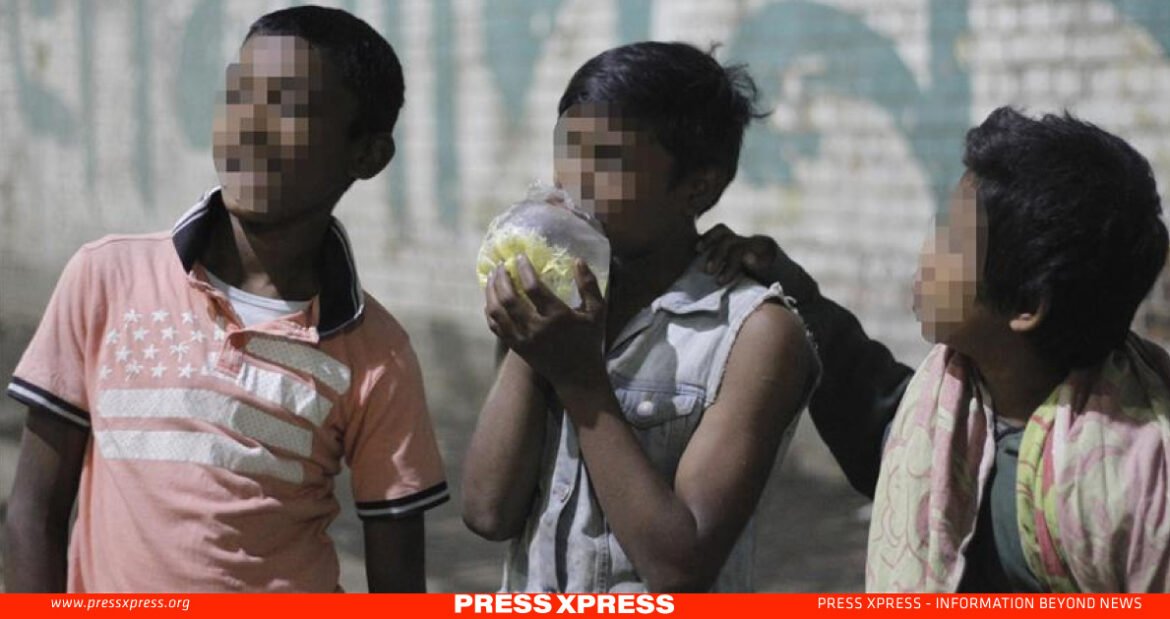Bangladesh is facing a crucial drug abuse issue. The government has taken a stance with a “war on drugs” campaign. Implemented strict laws to combat the problem. However, the underlying reasons behind this issue are not thoroughly investigated, i.e. the origins of these drugs and widespread availability in Bangladesh raises questions that need to be addressed.
The drug problem in Bangladesh is not a new phenomenon as the country has a history of cannabis and opium use for medicinal or religious purposes. The landscape changed in the 1980s when heroin entered the market smuggled from neighboring countries. Heroin, an opioid derived from the plant can be consumed through injection, inhalation, or smoking leading to euphoria but also posing significant risks of overdose, infection, and addiction.
You Can Also Read: FAILING YOUTH: UNRAVELING THE TROUBLING THREADS OF TEEN GANG CULTURE
But in recent years, a new trend has developed in this sector destroying the youth’s life like a virus. Beyond any doubt, Myanmar plays a role in exacerbating this crisis as it shares borders with Bangladesh on its side. Myanmar’s internal challenges have created an environment for drug production and trafficking of methamphetamine pills known as “yaba.” The term “yaba,” meaning “crazy medicine”, in Thai accurately reflects its effects.
Background

Situated between India and Myanmar, the country has permeable boundaries with both of them. This geographic proximity renders it a susceptible transit point for drug smuggling routes that originate from the Golden Triangle, a notorious region that produces opium and encompasses parts of Myanmar, Laos, and Thailand.
Role of Myanmar
The UN Office on Drugs and Crime (UNODC) reported that Myanmar produced nearly 795 metric tonnes of opium in 2022, almost twice the production in 2021. The UNODC attributed this to economic hardship and insecurity, in conjunction with higher global prices for the opium resin that is utilized to make heroin.
The opium industry in Myanmar is a complex and multifarious phenomenon, involving various actors, such as the military, ethnic armed groups, militias, drug lords, and farmers. The military, which usurped power in a coup in February 2021, has been implicated in profiting from the drug trade, either by directly participating in it or by permitting it to thrive in exchange for bribes and allegiance.
Ethnic armed groups, which have been in conflict with the central government for decades, have also been involved in the drug trade, either as producers, traffickers, or protectors. Some of these groups, such as the United Wa State Army and the Shan State Army, dominate extensive territories in the northern and eastern parts of the country, where most of the opium cultivation and methamphetamine production occurs.
Local armed forces, known as militias, have also contributed to the drug trade, either as enforcers, intermediaries, or competitors. They are allied with either the military or the ethnic armed groups.
Powerful and wealthy individuals or organizations, known as drug lords, have also exerted influence on the drug trade, either as financiers, organizers, or distributors.
Poor and marginalized farmers have also suffered from the drug trade, either as victims, beneficiaries, or participants. They grow opium poppies as a cash crop.
Yaba is primarily produced in Myanmar, which lies to the southeast of Bangladesh. Myanmar is a country that endures its own political and economic turmoil, creating a conducive environment for the illicit drug industry. Myanmar is part of the Golden Triangle, a notorious region that covers parts of Myanmar, Laos, and Thailand, and that is the world’s second-largest opium producer. But in recent years, opium has been eclipsed by methamphetamine, which is simpler and cheaper to produce and has a higher demand.
Methamphetamine is fabricated in covert labs in the jungles and mountains of Myanmar, often under the protection of ethnic armed groups or corrupt government or Myanmar army officials. It is then trafficked across the border into Bangladesh, using various routes and methods. Some of the traffickers are Rohingya refugees, who have escaped the violence and persecution in Myanmar and have settled in the Cox’s Bazar district of Bangladesh. They are exploited by the drug syndicates, who offer them money or drugs in exchange for their services.
The Effects on Bangladesh
The drug trade in Myanmar has had grave repercussions for Bangladesh, both in terms of public health and security. The UNODC states that Bangladesh is one of the main transit and destination countries for drugs from Myanmar, especially yaba and heroin. Various means, such as boats, trucks, cars, motorcycles, bicycles, animals, and humans, are used to smuggle drugs across the border.
The drugs have caused widespread addiction, especially among the youth, who are enticed by the low price and easy availability of the drugs. The drugs have also caused various health and social problems, such as overdose, infection, violence, crime, and family breakdown.

The drugs have also exacerbated corruption, terrorism, and instability, as some of the drug dealers and users are connected to criminal and extremist networks, such as the Rohingya militants, who have participated in attacks against the Myanmar and Bangladesh security forces.
The drugs have also strained the bilateral relations between Bangladesh and Myanmar, as both countries have blamed each other for not doing enough to curb the drug trade and cooperate on drug control.
Bangladesh is not only a destination for these drugs, but also a transit point for the regional and global market. The drugs are transported from Bangladesh to India, Nepal, Sri Lanka, and beyond, using land, sea, or air routes. The drug trade is a lucrative business, generating billions of dollars in profits for the traffickers, who have links with criminal networks and terrorist groups.
Conclusion
The fight against illegal drugs in Bangladesh is a long and complex one. Addressing the issue requires international cooperation, tackling the root causes in Myanmar, and prioritizing effective prevention and treatment strategies within Bangladesh. Only a concerted effort can break the stranglehold of this illicit trade and pave the way for a healthier, safer future for the nation.


